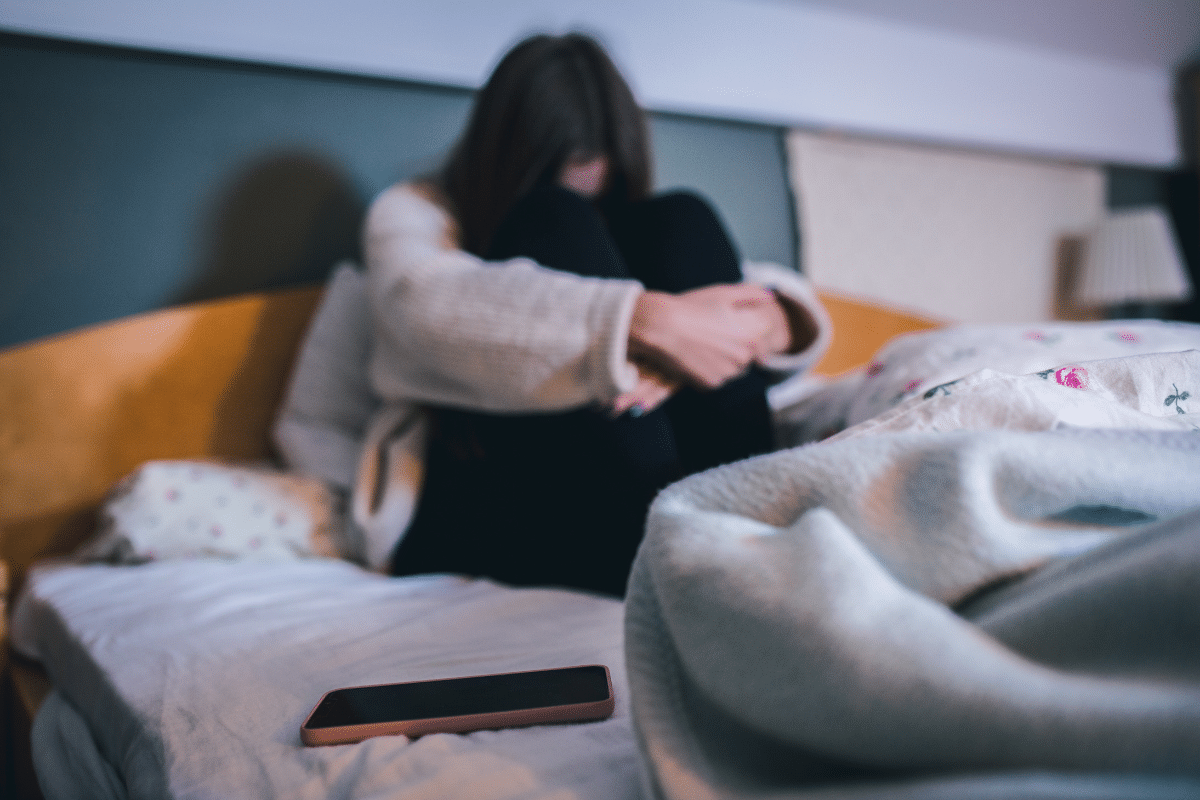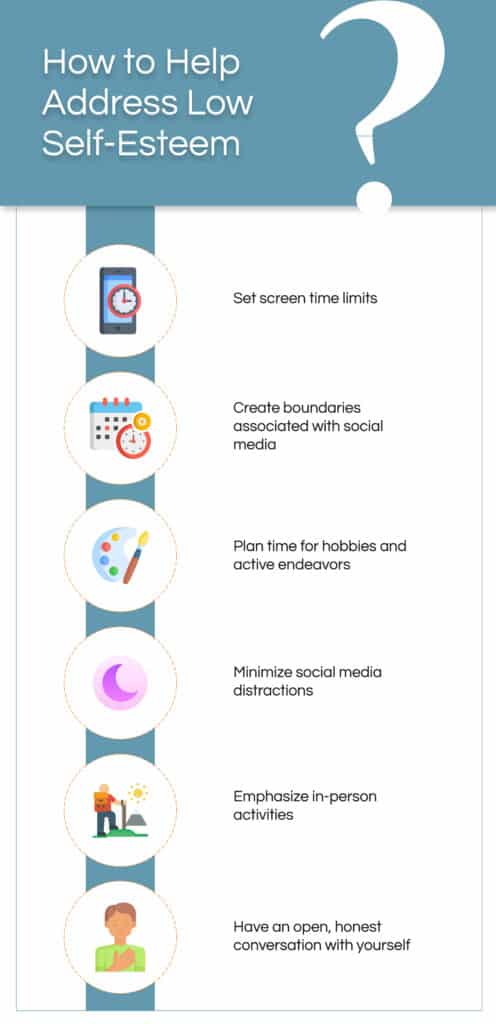Social Media and Low Self-Esteem
Frequent social media use can wreak havoc on self-esteem and mental health, creating a rapid downward spiral impacting all aspects of life. If you or a loved one have experienced the detrimental impact of social media on your self-esteem or mental health, our lawyers at Cutter Law are here to help. We’re dedicated to fighting massive social media corporations and holding them accountable for their actions, so schedule a free consultation today.
In a chronically online world, the effects of social media use on mental health have become increasingly evident. From low self-esteem to debilitating depression and anxiety, frequent social media use can lead to an array of adverse effects. Understanding the correlation between frequent social media use and its negative impacts is crucial.
At Cutter Law, we’re dedicated to helping people affected by social media get the help and compensation they deserve.
Quick Links
Social Media and Self-Esteem: The Statistics
Social media is a staple in everyday life for countless individuals worldwide. In the United States alone, around 72 percent of the population uses social media, compared to 43 percent in 2010.
Daily social media platform usage rates:
- Facebook: 70 percent
- Snapchat: 59 percent
- Instagram: 59 percent
- Twitter: 46 percent
- Youtube: 54 percent
Other apps, like BeReal and TikTok, are also highly popular, particularly among teens and young adults.
The Connection Between Social Media and Self-Esteem
Various studies have suggested a relationship between social media and low self-esteem. For example, a study released in JAMA Psychiatry evaluated social media use in 6,595 adolescents. Researchers found that individuals spending over three hours daily on social media are at an increased risk for mental health problems, including negative self-image.
Another study combined the results of two surveys that examined U.S. adolescents in grades 8 through 12. Researchers discovered increases in depressive symptoms, suicide-related outcomes, and suicide rates linked to new media screen time increases. Self-esteem and depression often go hand-in-hand, so this study further stresses the connection between self-esteem and media use.
How Does Social Media Affect Self-Esteem?
Social media can affect self-esteem in multiple ways. Social media is often a playground for comparison. In many cases, celebrities, influencers, and even those with smaller followings post photos and videos of themselves at their best.
Between makeup, lighting, posing, editing, and filters, photos and videos circulating on social media can paint a picture that is a far cry from reality. This creates a breeding ground for unhealthy comparison, with social media users comparing their everyday selves to an individual’s “highlight reel” in which that person is presented at their best.
Cyberbullying is another issue. Internet trolls and bullies leave nasty and hateful comments that can tear into an individual’s self-esteem.
How Do Spot Self-Esteem Issues?
Signs of self-esteem issues differ from person to person. In some cases, self-esteem issues manifest in less obvious ways, especially for quieter people who don’t regularly voice their emotions.
However, recognizing the signs of self-esteem issues is essential to addressing them.
Signs of Low Self-Esteem
Common characteristics of low self-esteem include:
- An inability to accept compliments
- Self-deprecation, including while joking
- Debilitating fear of failure
- Strong or overwhelming feelings of anxiety, depression, sadness, shame, or anger
- Ignoring or discounting one’s own achievements
- Shouldering blame when things go wrong, even if the individual isn’t at fault
Teenagers, in particular, may exhibit additional symptoms such as the following:
- Steadily declining school grades
- Refusal to assist with household tasks or challenges
- Giving up on a project or task when a roadblock presents frustration
- Abrupt mood swings

Consequences of Low Self-Esteem
Low self-esteem can produce devastating consequences, including:
- Increased anxiety, stress, loneliness, or depression
- Eating disorders
- Problems within friendships and romantic relationships
- Worsening academic or job performance
- More vulnerability to drug or alcohol use
How to Help Address Low Self-Esteem

Here are a few tips that can help improve low self-esteem stemming from social media use:
- Set screen time limits to avoid pouring hours into scrolling through social media. Some devices allow you to set time limits on specific apps, so you can place controls on ones you don’t want to use as often.
- Create boundaries associated with social media, including defined times for using it and when not to engage, such as before bed or first thing when you wake up.
- Plan time for hobbies and active endeavors. Take a walk, paint a picture, or play with your dog instead of scrolling mindlessly. Even a quick activity that steers your mind from the whirlwind of social media can be beneficial.
- Minimize social media distractions by adjusting your notification settings and putting your phone on “do not disturb” during certain parts of the day.
- Emphasize in-person activities with face-to-face interactions, such as hiking with friends, catching dinner with family, or visiting an amusement park with friends.
- Have an open, honest conversation with yourself about how unrealistic social media posts can be. Understanding the differences between what you see on social media versus real life can go a long way in redirecting the automatic comparison between yourself and social media figures.
You don’t necessarily need to jump head-first into every one of these tips. Incorporate small changes gradually, making them habits as you go for slow, steady improvements.
Resources for Help
Taking steps to improve your self-esteem can be overwhelming, especially if you’re unsure where to start. Therapy—whether conducted online, via video calls, or in person—can be very helpful in reconstructing your confidence and bolstering your self-esteem. Here are some online resources:
Consult an Experienced Attorney for Assistance with Your Social Media & Low Self-Esteem Case
The effects of low self-esteem stemming from social media use can be devastating. Unfortunately, social media corporations have designed their platforms to be highly addictive, effectively siphoning your time, energy, and money.

Cutter Law is at the forefront of litigation against social media giants to hold them accountable. The lawsuits allege that companies like Meta, the owner of popular social media sites Facebook and Instagram, knew of the harmful effects on mental health caused by their platforms. However, instead of acting to protect users, they purposefully implemented algorithms and other specific features designed to addict users to their platforms.
Our team of experienced lawyers at Cutter Law is dedicated to helping California residents hold massive social media corporations accountable for their actions. If you or a loved one has experienced the detrimental impacts of social media use, we’re prepared to help. Fill out our contact form to schedule a free case review today. There’s no fee unless we win.
Frequently Asked Questions
Who Is Most Prone to low self-esteem from social media?
While all individuals may experience low self-esteem from social media, women are often most susceptible to its effects. According to Dove Research, 69 percent of women feel pressure to meet unrealistic beauty standards, which increases anxiety. Furthermore, 56 percent of those women recognize “the impact of an ‘always on’ social media culture in driving the pressure for perfection.”
What Is a Social Media Lawsuit?
A social media lawsuit targets major social media corporations such as Meta or TikTok for intentionally promoting addictive algorithms on their platforms.
These cases allege the connection between the corporations’ use of addictive algorithms and the rise in poor health and behavioral and mental consequences, including depression, low self-esteem, and cyberbullying.
Who Can File a Social Media Lawsuit?
If you or a loved one has suffered from mental or physical harm by using a social media platform, you might be able to sue the social media corporation. The specifics vary from case to case, so it’s essential to consult an experienced lawyer for assistance in navigating legal complexities. Contact Cutter Law to get started with a free consultation today.
Schedule A Free Case Review
"*" indicates required fields
Our Office Locations
Sacramento Office
401 Watt Avenue Suite 100
Sacramento, CA 95864
Phone: 916-290-9400
Oakland Office
Cutter Law P.C.
1901 Harrison Street Suite 910
Oakland, CA 94612
